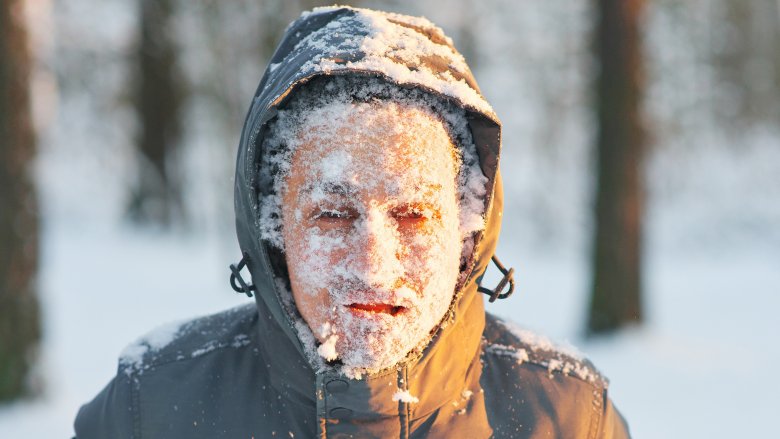The Lowest Temperature A Human Can Actually Survive
Extreme heat intuitively seems more lethal than extreme cold. When the weather outside is frightful, you can start a delightful fire, wear layers of clothes, and pack on warmth-giving fat by drinking too much hot chocolate. With heat, though, lighting a fire is counterproductive, you can't keep taking off your clothes once you're naked, and consuming too much cold stuff too quickly might give you brain freeze. So if air conditioning isn't enough and you run out of scarves to remove, your only recourse is to start ripping off your skin like Robbie Williams in that terrifying "Rock DJ" video .
Even scientists seem to assume heat is more dangerous, with the majority of studies about weather-related deaths focusing on heat waves, according to The Lancet. But here's the thing: death as a result of cold weather is the cause of a person's death 20 times more often than death from hot weather. This figure is based on a 2015 study by The Lancet that examined 74 million deaths in 13 countries. Given that harrowing finding, it's worth finding out how cold it can get before your goose is officially, uh, frozen.
Live Science explains that your body's core temperature should stay in the vicinity of 98.6 degrees Fahrenheit (37 degrees Celsius). Once your body drops to 95 degrees or below, hypothermia takes hold. This impedes the function of vital organs such as the brain and heart. When your core body temperature hits 91 degrees F (33 C), you might suffer amnesia. At 82 degrees F (28 C), you might lose consciousness. At 70 degrees F (21 C), you experience "profound," deadly hypothermia.
The coldest recorded body temperature a person has ever survived is 56.7 degrees F (13.2 degrees C), according to Atlas Obscura. That almost-corpse-sickle was a woman named Anna Bågenholm, who fell into a frozen stream while skiing in 1999. Could a person survive being even colder? We don't know, but if the water in your body's cells actually freezes, it will form crystals that "expand and physically rupture the cell[s], causing death," per the BBC.
A healthy person who's as dry as un-buttered toast but isn't dressed for winter weather may become hypothermic in as little as 10 minutes when the temperature hits minus 30 degrees F (minus 34 C). However, you don't need to be in a frozen lake or even freezing weather to risk dying of hypothermia. If you're sweaty or wet in the rain, you could experience hypothermia in 30- to 50-degree weather (between minus 1 and 10 degrees C). That's because "the body loses heat about 25 times faster in water than in air." Citing the aforementioned Lancet study, the CBC reports that 90 percent of cold weather fatalities recorded in Canada between 1985 and 2012 happened in mildly cold weather. So it's best to stay dry and dressed for the weather.
